
After baby “hood”, I thought nothing could be harder.
I had no idea that a toddler would make me look back on that first year and think no, that was the easy part. That was Parenting 101.
My toddler gave me a run for my money. I was in way over my head. I felt like I was failing in every way. If you have or ever had a toddler. You know exactly what I mean. Your toddler has brought you to your breaking point. You have had your not so best moments and been the mom you always judged. Cause that’s toddlers.
So finally, I decided to find someone who could help me. My friend, the expert (aka daycare and preschool teacher for over 30 years).
As I started to confide in her, she offered to help me. She would come over twice a week and work with us. I have never made a better decision.
Here is what I learned.
Natural consequences are the best way to gain cooperation
Your toddler learns not to touch something hot because the natural consequence is they get burned. Natural consequences teach them about how the world works. And it is the best way to end battles. They don’t think you are making unfair rules. Instead they learn how to navigate their own world. If your child wants to go outside without shoes in the middle of winter, let them, because they will understand the purpose of shoes very quickly.
I wanted my toddler to wear sunblock before we went outside but was so sick of the battle. Her advice was to pick a day when I had plenty of time and didn’t need to be anywhere. Then to ask if she wanted to go to the playground. Of course, she said yes. I then had to tell her that we couldn’t go until we put sunblock on. She lost her mind. I had to stay calm and just say okay then we can’t go outside until we put our sunblock on. I then put mine on. She carried on for 45 minutes. I just continued with the day.
When she would say I want to go to the playground I would say great, let’s get your sunblock on. I never put it on her until she decided it was okay. Eventually, she decided she wanted the sunblock because she finally realized that this was the only way to play outside. It ended the battle. The natural consequence of not putting on sunblock was no playground.
The next time, it took her 15 minutes to come around to the fact that this was the rule every time. She very quickly learned that if she wanted to go outside, then she needed sunblock. We never had the battle again and now she reminds me when I forget to do sunblock before we leave. She also tells her dad before he goes to work that he needs sunblock to go outside.
Remember to HALT to reset
This is a very helpful phrase to keep in mind when your toddler is falling apart. It stands for hungry, angry, lonely and tired. Before doing anything, try to run through these and see which one applies to your child.
I forget a lot how often they need to eat or just have some water. Once they get to a certain point in their meltdown, they don’t always ask or know how to ask for what they need. Try a snack, offer a simple hug or switch the activity.
I am surprised how often a temper tantrum can be avoided by addressing one of these.
Practice words
Once your toddler can speak, you need to get in the habit of making them use words for everything. The more they practice, the better they get. Once they gain enough vocabulary don’t take yes or no answers. Always have them use full sentences. Even when you check out their books from the library, have them do the talking. You can tell them what to say, but have them do the interacting.
This is so important. The more they practice, the more words they know and the better they are able to use them. You will have fewer temper tantrums and less “bad behavior” like hitting because they have a tool (words). It also allows kids to be more assertive. Another important skill when they finally reach school age.
So, when they start to melt and whine and you realize they are hungry, say I see you are hungry, do you want a snack? If the answer is yes, then ask them to say “I want a snack please.” The more they practice using their words to ask for a snack, the more they associate that feeling (hunger) with the correct action (asking for the snack).
Seriously for everything, tell them what to say and have them repeat it if they can’t think of the words or are struggling.
Avoid double processing
The best example I can think of to explain double processing is if you are reading directions on a recipe and everything is what you aren’t supposed to do and you need to do the opposite. For instance, instead of saying “use pepper”, it would say “don’t use salt” or instead of saying use hot water in the pot, it would say don’t use cold water in the pot.
Your brain must first process what not to do and then figure out what to do. When you ask your toddler to not hit, they are left knowing they shouldn’t hit but probably clueless on what to do to have their feeling heard and how to get their toy back. Try to tell them instead what to say in that situation.
In Amy McCready’s parenting course, she calls this double processing. I have taken a fair share of parenting courses and usually walk away with a few good tips for a specific behavior but nothing earth-shattering. However, Amy’s parenting course is a legit foundational course. I learned more about parenting in her course than in any other blog, book, or class. It really gives you tools to use for any situation for any age from toddlers to teenagers with data to back it all up. Her explanations on why external rewards don’t work long term and what to do instead was mind-blowing.
Seriously after her course, my children help out around the house, have fewer power struggles and we have more fun together as a family. If you want a course that will help you be the parent you want to be, then try out her free parenting course. There is also a really fun parenting personality quiz that was really eye opening. Now that I have gone off on a tangent, back to toddler tips!
The best calming down tool
Another really important step in temper tantrums is learning the ability to calm down. My friend said they use this one in their classroom all the time. Once the emotions get going, they instruct the kid to take some deep breaths. This really helps a kid come back down.
Honestly, when she suggested this I didn’t really think this would make a big difference. But I gave it a try because my method (trying to talk logically to my child) wasn’t working. I started by every time she would spiral out of control, I would say very calmly that I see you are having some strong feelings, let’s take some deep breaths. She would yell no at me initially. I just kept saying deep breath and doing them myself. She eventually started to do them. And after about 2-3 deep breaths she was calm. I then ask her to use her words and tell me what she needs or what’s going on, etc.
After using this method for a few weeks, she reminds her baby sister to do deep breaths when she cries. She also will do deep breaths when she loses it after I remind her to. It has literally taken 20-minute temper tantrums and changed them into 1-2 minute outbursts. We also use this when she starts to just whine.
My friend told me that it is fine that I help my kid calm down with hugs and there are still sometimes when we do that. However, that isn’t a skill she can take with her to preschool. This is teaching her to identify when she is having feelings, calming herself down and then being assertive and articulating what is going on.
Observe before assuming
If you are having issues with your toddler, the best thing I learned was to not assume. For example, when we would go to a sing-along at the library, my toddler would end up screaming and crying. She hated it. I assumed she was overwhelmed because that is something that I would feel. I then assumed it must be too loud. I was wrong both times.
I finally took a step back and tried to just observe. I realized that it was one particular song that would set her off. It was a song about stubbing your toe. She had hurt her toe months ago and still kept a Band-Aid on it at all times. She hated taking her socks off and would start crying when she saw her toe saying “it still hurts”. So, once I realized what song set her off, it wasn’t hard for me to guess why.
The next time, I asked the teacher if she could skip that song just for today so I could see if I was right. No meltdowns at all. We then asked her to keep the song in the rotation in the future because if they fear something, you should never avoid it, which brings me to my next point.
If your child has fear or anxiety about something, keep doing it
It is really important to keep in mind that toddlers (and kids) go through phases. Our toddler became scared of loud noises. I then started to avoid loud noises because I didn’t want her upset. This is the absolute worse thing to do because you are affirming to them that they are indeed scary and something to be avoided and feared.
Instead, you should not avoid or shy away from what scares them. You should do it like it’s no big deal no matter what fit they throw. Validate their feelings such as “wow that is a loud noise. It can sound scary. If you don’t like it, then you can cover your ears and it isn’t so loud anymore.”
If they fear group settings, then you need to keep going. Start by letting them stay on your lap the whole time. If that is too much, then use a time (see timer tip below) and tell them we will stay for 5 minutes. Work up to the full duration. After that, you have them sit next to you and then a little farther away.
They need to see themselves succeed. They need to get through it to know it isn’t scary. Validating their feelings is different than confirming their fears.
The apple doesn’t fall far from the tree
I was complaining to my friend (the preschool teacher) about how my toddler doesn’t like baths, being wet, pools, splash parks or the playground. She just screams. She said that she thinks she might be very sensitive to temperature.
She then also said that if both my husband and I thought about it, one of us was probably like that as a child or still are. She nailed it. I to this day hate temperature changes. I am such a chicken over getting into a cold pool. I hate the heat; it makes me fussy.
Therefore, it shouldn’t be a shock to me that my child is just like me. However, I had this idea in my head of what a toddler should be like. I saw all of these other kids who were soaking wet at splash parks with blue lips having the time of their life. I didn’t understand why my child wouldn’t partake and now I get it.
I became much better at taking this into consideration. I tried a lot of different bath temperatures until we found the right one (bath battle gone). She went from hating the bath to loving it. We only go to the park in the early summer mornings before the heat kicks in. We also only go to heated pools and she loves them.
I was also going to tell her that my toddler doesn’t like big crowds but then again, guess who gets all stressed out in group settings (guilty).
Check your own reactions
On the note of “the apple doesn’t fall far from the tree”, my friend reminded me to be careful of my own reactions. For example, because group settings stress me, how much does my stress rub off on my kid?
At Storytime if there are a lot of kids, I’m having an internal panic attack. I realized that my nervousness and stress with that many kids in one setting was showing her that this is something to panic about. She totally took my reactions as cues on if the situation was a good or bad one.
Now, when I see my own anxiety getting high, I make an intentional effort to reign it in.
A visual timer teaches the abstract idea of time
Not understanding time makes life challenging for your toddler. You say you will be back in a second when in reality you mean 5 minutes. You tell kids you have 3 minutes to play but what does that really mean? Also, how good are you in actually having 3 minutes be 3 minutes?
You really want kids to understand time because it will make your life so much easier. I had no idea that a visual timer would change my life. You can get a free one on your phone by downloading a visual timer app or just get a simple battery-powered visual timer.
Introduce the timer
Now introduce the concept by starting to time everything. Let them help you set it and then ask them to keep checking how the time is doing. They will see the red bar (in my case) start to disappear. When it is all gone, the timer rings.
Examples of easy things to time: we can play with this toy for 5 minutes (set the timer). We need to wait 10 minutes before it’s lunch time (set the timer). When they ask you to do something such as read a book, say I can in 2 minutes (set the timer).
Use it for waiting and leaving
The result is that they are better at waiting and leaving. It gives them a way to understand time. Now, I don’t use it all the time after we literally used it for everything for a week to learn about it. But now, when my toddler doesn’t want to leave or she won’t wait, we can use it to avoid the meltdown.
She is just so much more willing to do something if the timer says we need to instead of me saying we need to. By having her help set the timer, I think it also lets her feel like she is making the decision and has some control.
Use it for bedtime
Another really awesome trick I learned is that when my toddler doesn’t want to go to bed or let me leave, I ask if she wants me to check on her. She always says yes, and she sets the timer for 20 minutes. Most of the time she is asleep before then but if not, I go in and we set timer again for another check.
If you still have to stick around until they fall asleep, then use the timer to change that. If you used it for a few days throughout the day, then they understand that once you set it, it will always go off. You can have them set it for 1 minute to start and slowly increase the time. After they are sure you will come back every time, and the timer give them reassurance of this, then you should be able to just set a timer every night and check in after 30 minutes or so.
Don’t compare your kids social learning with daycare kids
If your child is home with you, then they will go through the “social learning” phase differently than a kid who has been in group settings since birth. It does not mean your child is behind. It just means they have not been exposed to that type of environment to build those skills yet.
Once you hit preschool and they become one of the ducklings (and get over the adjustment phase), then you will see them catch up. Keep exposing your child to other kids through story times and playdates but keep in mind the type of care the other children have before thinking your kid is behind.
I was so worried that my toddler was behind. My friend reassured me that she wasn’t. She was perfectly fine. She didn’t need to know how to talk or play with kids on her own yet. Most kids (especially in the last generation where a lot more moms stayed home) go through this phase between 3-4 years old.
Praise publicly, correct privately
Like all good managers know, the best way to mentor is to never correct someone when it could embarrass them. This goes for toddlers too. It also means not to do it in front of their siblings. The best way to get a child to do something or correct their behavior is to praise another child for the exact thing you want your kid to do. “Wow, Emma I love how you say please when asking for a snack.” Note that I didn’t compare at all in that statement.
Tell them what to do
Another easy way to steer clear of correcting in public is to instead tell them what to do. If your kid is running away, ask them to come back and tell you where they are going or ask them to come hold their sister’s hand. If they are throwing sand, suggest that they make a sandcastle and get them started. With toddlers, this is very easy because they are so easily distracted.
Continually tell them the right action to do, so for instance instead of don’t grab at people’s faces, let’s say hi and wave their hand.
The more you tell them “don’t” the more they will do it because they usually can’t come up with the correct action themselves. We know you should walk and not run, but why would they? If you remind them every time, they will start to learn I walk when I am in the library, etc.
Social stories should be used by all parents
Social stories are well known by special education professionals. However, they can really help all children. Similar to any book you might read your child, a social story is a book about them. In the book they tackle something that is scary to them or something they struggle with.
It is positive reinforcement and encouragement at its finest. They get to see themselves face their fears, overcome them, and succeed. Then the next time they are in that situation, they will have more confidence knowing they can succeed. Another aspect of most social stories is that you give them tools to succeed. You can then remind them about the social story and the tools the next time you are in that situation.
Comfort, ignore, distract
You know those days when you just can’t handle another fight or meltdown, instead of engaging in a power struggle, try this method. My friend said they use this in preschool when nothing else is working. First comfort so they know you hear them and that their feelings are validated. After a quick comfort, completely ignore the behavior and find something to do.
Her favorite go to is to pick up a book and start to read it out loud. A toddler’s interest in what you are doing usually distracts them from their meltdown. Curiosity always wins. Other options are to start playing with a toy or doing an art project.
Sibling golden rules
Since my toddler was also going through the adjustment of having a new sibling, my friend gave me some good advice here. I think this is a very common toddler thing to experience since most people space kids 2 or 3 years apart. And it really is an adjustment for both your child and you as your parenting needs to change.
First, she said to read the book Siblings Without Rivalry, which is by far the best step I have taken to helping my siblings become lifelong friends.
The “big” rules she highlighted that are also touched on in the book are
- Describe the situation when a problem arises and then hand it back to them. For example, I see your sister also wants to play with the book. You had it first, so it is your turn, but it is also your choice to decide to share it. I will let you decide but I think it would be nice for you to share it.
- Never praise or correct by comparison. In general, never compare because those comments can do some serious damage especially when they are attached to praise or correcting behavior. Instead of your sister cleaned her room, you need to also. You could tell the sister “wow, it makes me so happy you cleaned your room” and that sometimes actually gets the other one to do it because they also want that praise. Or you could just tell her “I need you to clean your room before we can leave.” Do not add just like your sister to the end of it.
Pursue your toddler Today
Toddlers can be cute as a button, say the sweetest thing, and show you more love than you thought possible. They can also make you feel like the biggest failure, question your sanity and exhaust you beyond belief.
No one knows how to handle these little people more than someone who works with them day in and day out. My friend has been a preschool teacher for more than 30 years. I never gave that profession much thought or credit until I had my own toddler. Now, I know they should get paid way more than they do.
My friend really helped me out with how to best handle my toddler’s emotions to facilitate her continued growth in the best possible way. She also gave me some sanity by giving me tools. I hope these tools help you out too. If you want more ideas on parenting, be sure to check out my favorite free parenting course.
If you found this post on toddler parenting helpful, please share it on Pinterest or Facebook

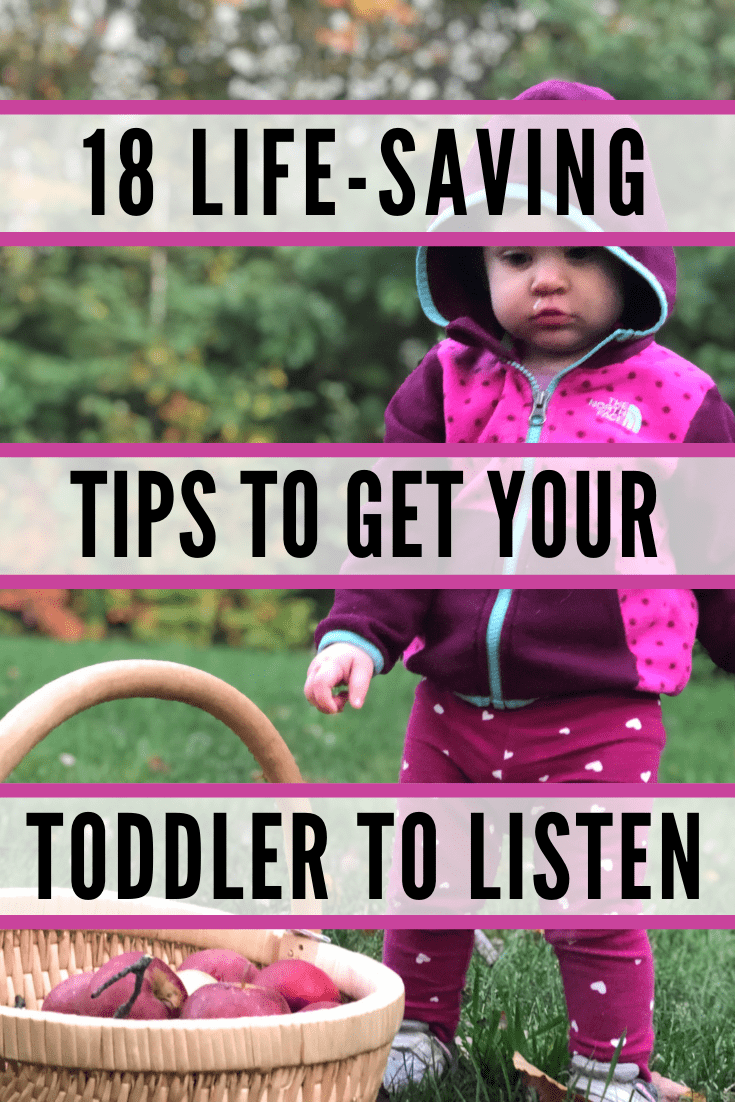

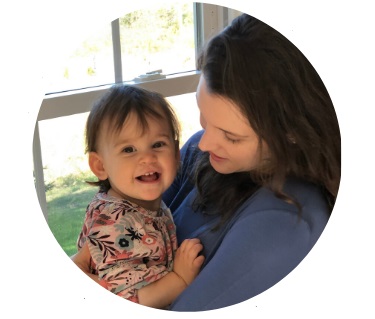
I am a wife, teacher, and mother to two awesome girls. I write about what I am passionate about, which includes being a mom, house projects, beauty and skincare. I love to share my experiences, failures, and successes with my readers. Let this space be a resource for you to pursue your very best day.

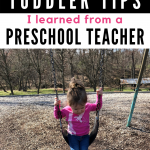
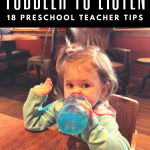
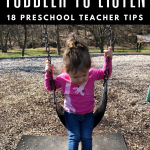


Julia
Tuesday 16th of January 2024
This is one of the best posts I have ever read on this topic. So practical and doable. Thank you so much!
Jemuel Idanan
Saturday 7th of October 2023
Hi, Emilia.
Jemuel Idanan
Saturday 7th of October 2023
This was a great article! You gave a lot of helpful advice. Thank you!
Barbara
Wednesday 6th of September 2023
Thank you. I really enjoyed this article. My one suggestion is to eliminate the phrase ‘I like it when you…..’ because you don’t want to train your child to always want to do something to please others. Substitute phrases like ‘Wow! How clever you are when …..’. or ‘ That feels really nice when you…..’. It helps your child develop self confidence and a sense of personal accomplishment. Barbara - Early Childhood Teacher
Jemuel Idanan
Tuesday 29th of August 2023
Loved this! Thank you